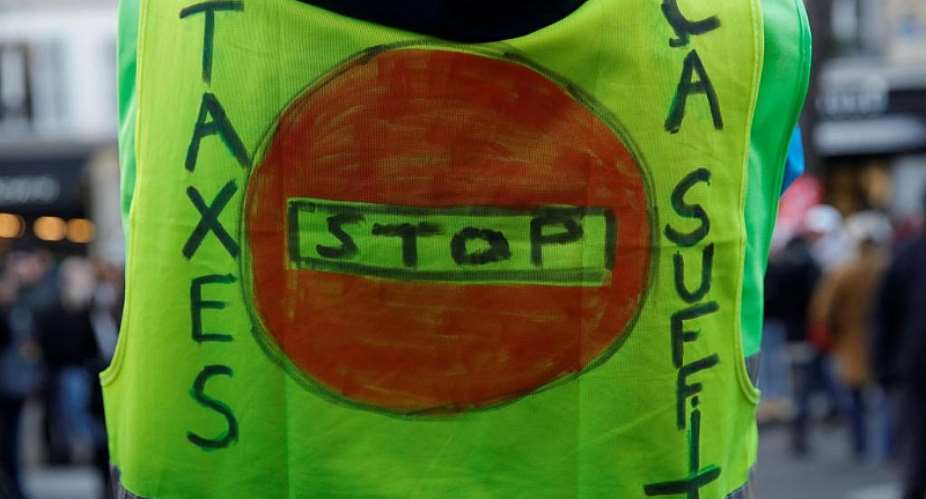As the first anniversary of the Yellow Vest movement approaches, demonstrators turned out in several French cities for a 52nd gathering. They hope to inject fresh momentum into weekly demonstrations calling for social justice.
Nearly a year after a planned fuel price hike sparked the amorphous 'Yellow Vest' movement in France, debate about the carbon tax is still rampant.
"It's a polarising issue," says Meike Fink from the Climate Action Network (CAN), who is in charge of overseeing a fair energy transition at the European NGO.
"The diesel fuel tax was what triggered the Yellow Vest movement. The protesters were right, the tax unfairly targeted lower-income households, but it doesn't mean it should be scrapped," she told RFI.
In December 2018, the French government suspended its plans to increase fuel prices in hopes of quelling the Yellow Vest protests.
But the demonstrations quickly spiralled into a rising groundswell of economic and class anxiety that the government has so far been unable to address.
When he came into power in 2017, French President Emmanuel Macron vowed to wean the country away from its reliance on fossil fuels and use the tax to fund renewable energy investments.
Strong signal
"The Yellow Vest movement sent a very strong and rousing signal that energy transition must be fair factor in social costs," comments Fink.
The fuel price hike was meant to encourage drivers to embrace less-polluting cars.
But the plan backfired. Rising global oil prices, combined with the carbon tax, infuriated residents in rural France who are mostly dependent on their cars for day-to-day transport.
A similar scenario is at play as oil prices climb yet again following recent attacks on Saudi facilities.
A green and yellow alliance?
For now, the carbon tax remains on hold.
Its fate in the hands of a citizen's panel of some 150 members who will advise France on how to best cut carbon emissions by 40% before 2030.
For Fink, "proposals going forward must include social as well as ecological needs and strive to reduce inequalities."
"The merit of the Yellow Vests was to show us that the two go hand in hand."
Asked whether the activists' rejection of the proposed fuel hike puts them in collision with environmentalists, Fink said an alliance between the two groups was possible.
"There is a growing yellow and green alliance because the underlying problem is not the fuel price hike linked to the carbon tax. It is a structural problem. That is: how do we offer low-income households a fair energy transition?"
For organisations like the Climate Action Network, the answer is to use part of the fuel tax's proceeds to support low-earning families.
"This will offset the negative consequences of the tax hike and make the energy transition more palatable," said Fink.





 We’ll protect state wealth from opaque deals – Prof Jane Naana
We’ll protect state wealth from opaque deals – Prof Jane Naana
 Mauritania president says running for second term in June polls
Mauritania president says running for second term in June polls
 I won't ever say I was a mere driver’s mate' — Prof. Opoku-Agyemang
I won't ever say I was a mere driver’s mate' — Prof. Opoku-Agyemang
 2024 polls: 'EC struggling to defend credibility'— Prof. Opoku-Agyemang
2024 polls: 'EC struggling to defend credibility'— Prof. Opoku-Agyemang
 Akufo-Addo gov't's 'greed, unbridled arrogance, unrestrained impunity, sheer dis...
Akufo-Addo gov't's 'greed, unbridled arrogance, unrestrained impunity, sheer dis...
 Election 2024: Ghana needs an urgent reset, a leadership that is inspiring – Ma...
Election 2024: Ghana needs an urgent reset, a leadership that is inspiring – Ma...
 Partner NDC to rollout a future of limitless prospects – Prof Jane Naana Opoku-A...
Partner NDC to rollout a future of limitless prospects – Prof Jane Naana Opoku-A...
 NPP will remain in gov’t till Jesus comes — Diana Asamoah
NPP will remain in gov’t till Jesus comes — Diana Asamoah
 Sunyani Technical University demands apology from former SRC president over sex-...
Sunyani Technical University demands apology from former SRC president over sex-...
 'Dumsor' was resolved by Mahama but ‘incompetent' Akufo-Addo has destroyed the g...
'Dumsor' was resolved by Mahama but ‘incompetent' Akufo-Addo has destroyed the g...
